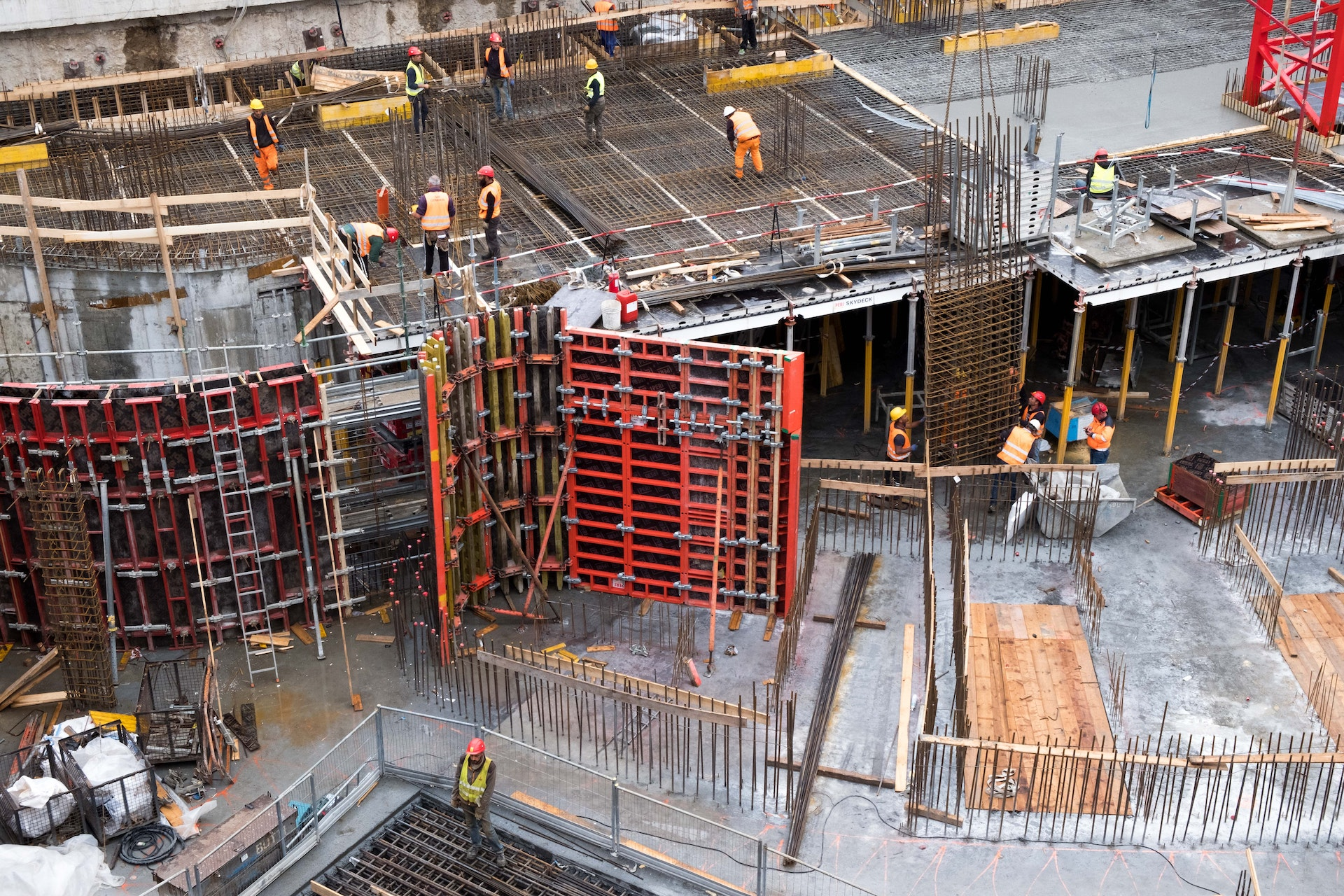Are you ready to build a rewarding career in the UK construction industry? With an expanding market and diverse job opportunities, now is the perfect time to explore this thriving sector. In this blog post, we’ll guide you through the landscape of jobs in UK construction, revealing top companies, popular locations, and invaluable tips to help you land your dream job.
The UK construction job market is growing steadily and offers a variety of opportunities for individuals with any experience level.
Salaries in the sector average £45,774 per annum, with remote and hybrid work options available.
Job seekers should stay informed by researching potential employers, networking events & job boards to find suitable roles that meet their needs.

A rising number of construction jobs are available in the UK, thanks to the industry’s steady growth and positive outlook. From project management to civil engineering, there’s an exciting array of opportunities for both experienced professionals and newcomers. While some roles might require working on construction sites and adhering to building regulations, others involve providing support services and maintenance for commercial buildings.
The UK construction industry is home to various trades and building systems, such as:
Pipefitters
Planning and development surveyors
Plasterers
Joiners
Bricklayers
Scaffolders
Roofers
Painters and decorators
Tilers
Glaziers
No matter your skillset or experience, there’s a great chance you’ll find a construction job that aligns with your career goals.

The construction industry boasts a mix of well-established firms and emerging companies, offering a plethora of job opportunities. Key roles in the sector include:
Operations Senior Team Leader
Resident Engineering Team Leader
Solution Architect
Construction Manager
One example of an emerging company is Multi Trade Plus Limited, the UK’s leading provider of site investigation services and technical support in the construction sector.
For job seekers, maintaining up-to-date knowledge about top companies hiring in construction is beneficial. This can be achieved by:
Researching potential employers
Understanding their requirements
Keeping abreast of industry news
Regular engagement in networking events
Exploration of job boards
These actions will keep you informed about the latest job openings and company updates.
The construction industry encompasses a wide range of specialized job categories. Some examples include:
Building Construction
Heavy or Civil Construction
Industrial Construction
Environmental Construction
Commercial Construction
Residential Construction
There’s a role for every skillset and interest in the construction industry.
In the following subsections, we’ll delve deeper into three main categories: project management, site management, and engineering.
Project management roles in construction involve overseeing the planning, coordination, and execution of various construction projects. A construction project manager, town planners, construction contracts managers, and plant hire controllers are just a few examples of professionals engaged in project management.
Success in project management roles, such as a project manager, requires professionals to have a diverse set of skills and qualifications. For instance, town planners need knowledge of the local area, data interpretation, and communication skills, while construction contracts managers require industry expertise, budget management, and negotiation capabilities.
As professionals advance in their careers, they can attain higher-level positions such as head of planning, project director, service delivery manager, or operations manager.
Site management positions in the construction industry focus on overseeing the planning, coordination, and execution of construction projects. As a site manager, this entails managing personnel and subcontractors on building sites while ensuring compliance with safety management systems and building regulations. Job duties in site management can vary greatly depending on the role, ranging from building surveyors providing advice on design and construction to electricians executing responsive repairs in tenanted properties.
Qualifications and experience required for site management positions can differ according to the role. Building surveyors typically need a degree in surveying or a related field, while electricians may need a qualification in electrical engineering or a similar area.
Professionals in site management can thrive in their careers and contribute significantly to the success of construction projects by gaining the required qualifications and experience.
In the construction industry, engineering roles span a variety of disciplines, job duties, and specialized knowledge. Engineering construction workers are responsible for ensuring proper operation of machinery and equipment in buildings, oil rigs, and sports stadiums. Their tasks can include fitting, repairing, and maintaining the machinery, buildings and equipment, which are essential aspects of construction work.
For professionals in engineering roles, obtaining the appropriate qualifications and certifications is of paramount importance. These credentials not only demonstrate your expertise but also help you stand out among other candidates in the competitive job market.
As the construction industry continues to grow, engineering professionals will remain in high demand, making it an excellent career choice for those with the right skills and experience.

When contemplating a career in this booming sector, gaining an understanding of the UK construction industry’s salary landscape is crucial. Here are some key points to note:
On average, construction salaries in the UK are £45,774 per annum.
Entry-level positions start at £31,060 per year.
Factors that influence salaries in construction roles include experience, qualifications, location, and the type of role.
During salary negotiations, doing research on the job’s market rate and comprehending the employer’s budget is vital. By having a clear understanding of your worth and the industry’s salary standards, you can confidently negotiate a fair compensation package that reflects your skills and experience.
Remember, your salary is just one aspect of your overall compensation, so be sure to consider other factors such as benefits, job security, and work-life balance when evaluating job offers.

Major cities and regions in the UK with a high demand for construction professionals include London, Birmingham, Manchester, Leeds, and Glasgow. Additionally, some roles, such as the Mobile Maintenance Electrician position, offer work-from-home opportunities in locations like Preston, Blackburn, Leyland, Blackpool, Longridge, and Chorley.
Focusing your job search on these popular locations can enhance your prospects of finding a fulfilling construction job that suits your career aspirations and preferences, including some featured jobs.

The construction industry offers a variety of employment opportunities, including:
Full-time positions
Part-time positions
Contract positions
Temporary positions
Freelance positions
This range of options allows professionals to choose the work arrangement, from Monday to Friday, that best suits their needs and preferences.
Whether you’re looking for the stability of a full-time role or the flexibility of a freelance opportunity, the construction sector has something to offer for everyone.

The required experience and qualifications for construction jobs in the UK vary depending on the role. While a high school diploma or equivalent is typically the minimum requirement, further qualifications such as a college degree or specialized training may be needed for certain roles. In the UK, a valid CSCS card is generally required for most construction jobs, demonstrating a worker’s knowledge and experience in the industry. Other certifications might also be necessary depending on the job.
On-the-job training is commonly required for construction jobs in the UK, encompassing safety protocols, tool and equipment usage, and other job-specific skills. Gaining the required experience and qualifications can boost your odds of landing an enriching job in this flourishing industry.

As remote and hybrid work arrangements become more common, the construction sector is adapting to this trend as well. Remote and hybrid work opportunities allow employees to work from home or other remote locations or a combination of remote and on-site work. These arrangements can offer increased flexibility, enhanced work-life balance, decreased costs, and heightened productivity.
However, remote and hybrid work opportunities also present challenges, such as difficulty in communication and collaboration, absence of face-to-face interaction, and difficulty in monitoring and managing remote employees. In contemplating employment arrangements in the construction sector, evaluating the advantages and potential difficulties of remote and hybrid work opportunities is key to making informed choices.

Being proactive in your job search is critical to enhancing your chances of finding your ideal construction job in the UK. Here are some strategies to consider:
Utilize online job search platforms like Indeed, Reed, and Totaljobs, which offer a wide variety of construction job listings.
Network with industry professionals to expand your connections and increase your visibility.
Attend construction events and job fairs to meet potential employers and learn about job openings.
Join professional associations related to the construction industry to stay informed about industry trends and job opportunities.
By implementing these strategies, you can increase your chances of finding the construction job you desire.
Another effective strategy is to explore company websites and submit applications through their career portals. Registering with specialized recruitment agencies that focus on placing candidates in construction roles can also be beneficial, as they can match you with job opportunities that align with your skills and preferences.
Utilizing these resources and maintaining persistence in your job search will significantly aid your journey towards landing a rewarding construction job in the UK.
For a successful job application in the UK construction industry, it’s vital to create a robust and customized CV. Be sure to include a summary of your qualifications, a list of your relevant job duties, and any awards or certifications you have received. Emphasize your qualifications and demonstrate why you’re an ideal candidate for the position. For those entering the construction industry, apprenticeship programs can provide valuable practical experience and training.
To prepare for interviews, research the company, practice common interview questions, and demonstrate your knowledge and enthusiasm for the industry. Showing genuine interest and a willingness to learn can go a long way in impressing potential employers. With a strong application and well-prepared interview, you’ll be one step closer to landing your ideal construction job in the UK.
In conclusion, the UK construction job market offers a wealth of opportunities for professionals with diverse skills and interests. By understanding the industry landscape, researching top companies, and utilizing effective job search strategies, you can confidently navigate the application process and secure a rewarding career in this thriving sector. So, why wait? Start building your future in the UK construction industry today!
To get a job in construction in the UK, you’ll need knowledge of building and construction, an eye for detail, the ability to use and maintain machines and tools, and good physical skills such as lifting, bending and carrying. Additionally, the ability to work well with others is key.
The UK job market is in demand for construction roles, such as builders, electricians and plumbers, with over 65,000 open vacancies listed.
A career as an HVAC technician, ironworker or carpenter is among the best paid jobs in construction in the UK, with average salaries of up to £30,597 per year.
Depending on experience level and location, construction workers in the UK can earn an average salary of between £26,406 to £77,500 per year. Salaries also vary across cities, with salaries ranging from £22,880 to £64,975 and hourly pay of £11.00 to £31.24.
The UK construction industry offers various job roles, such as project and site management, engineering, and specialized trades, providing a wealth of opportunities for those looking to join the sector.